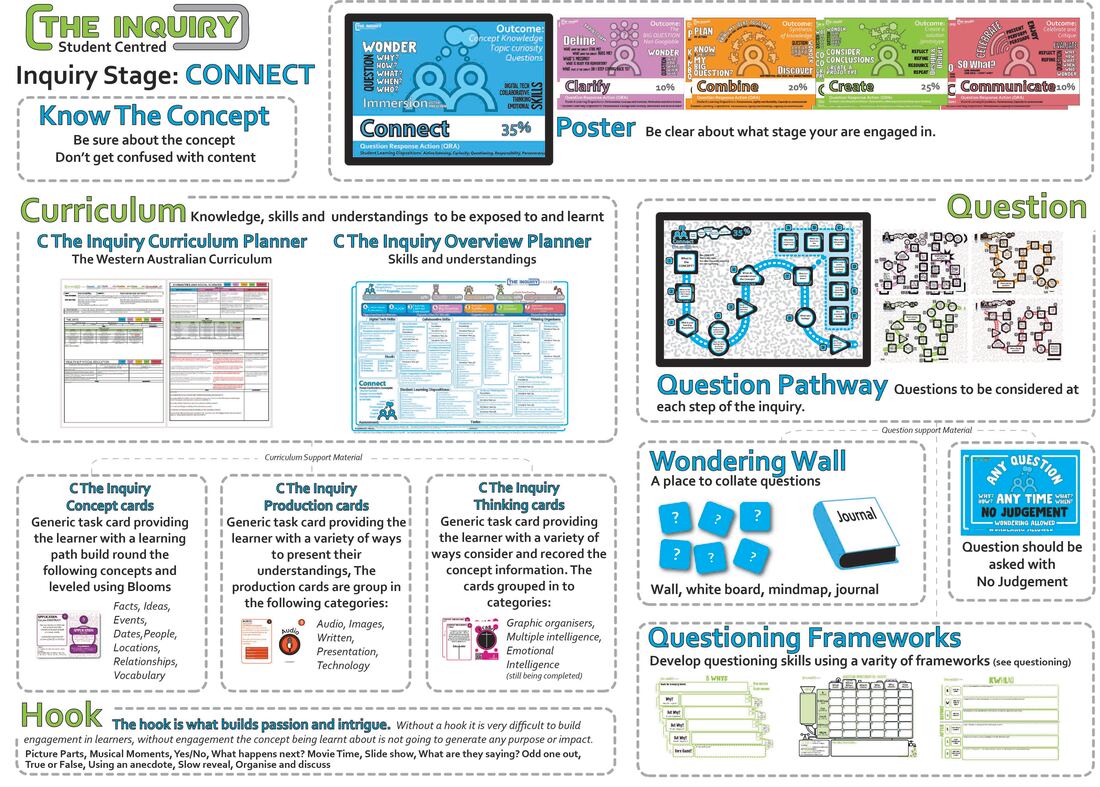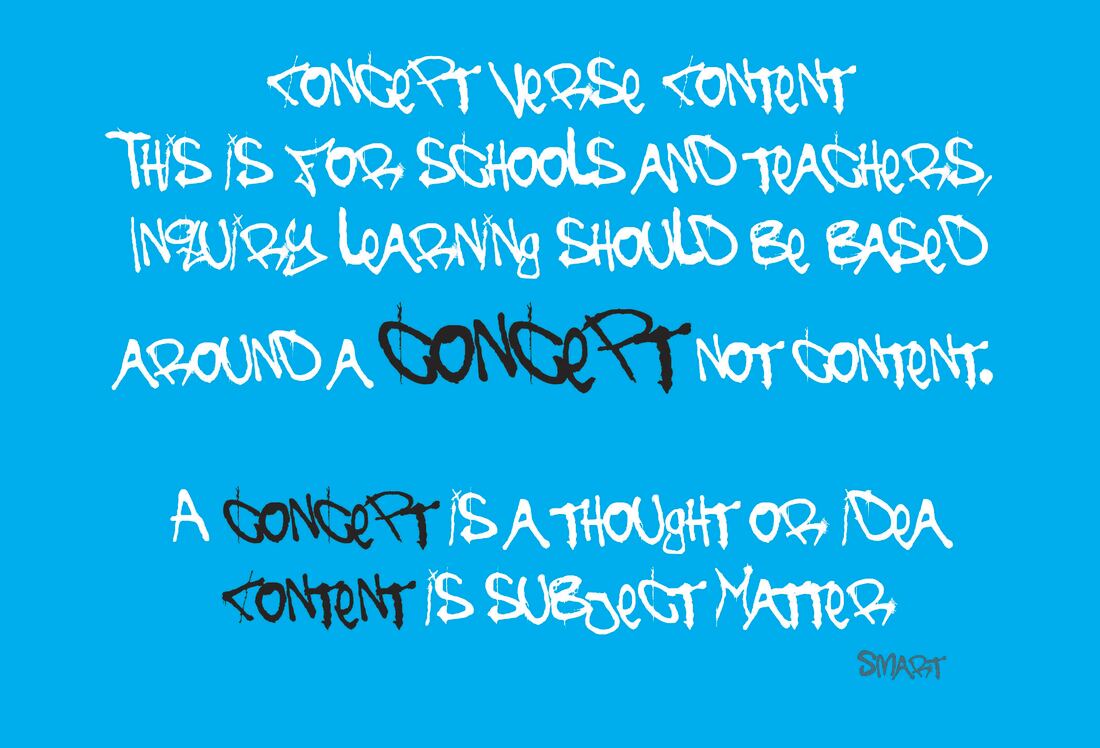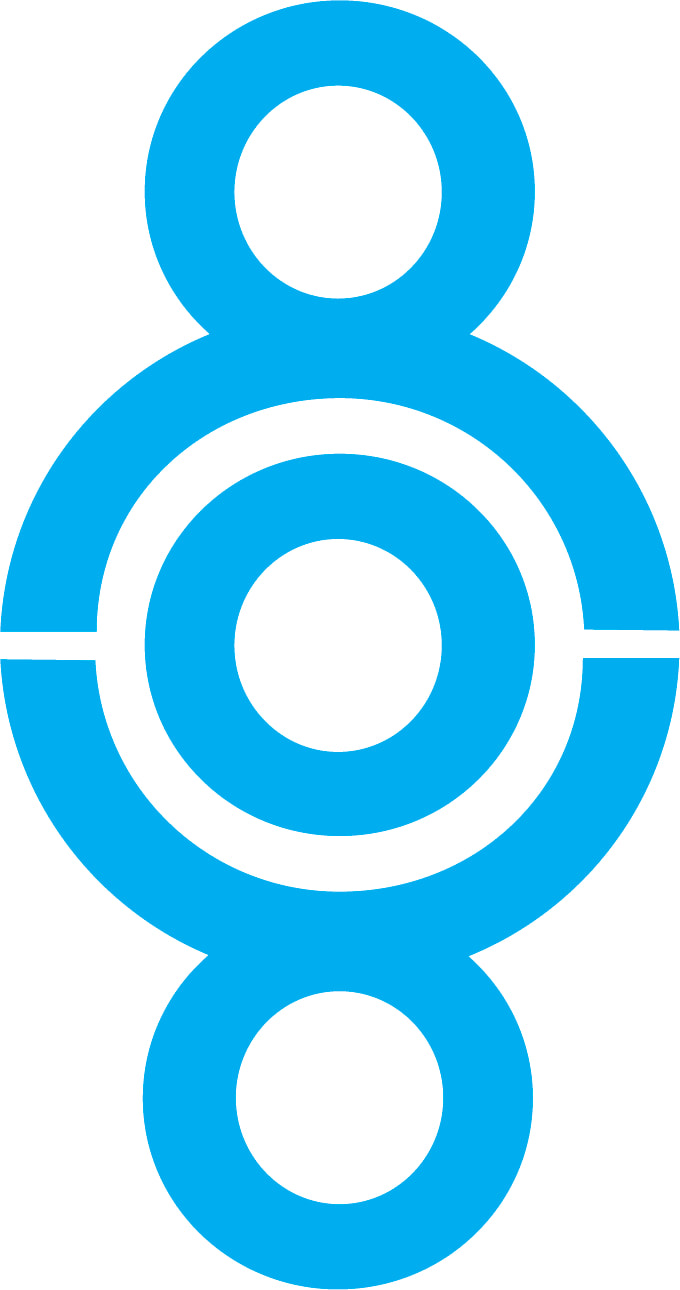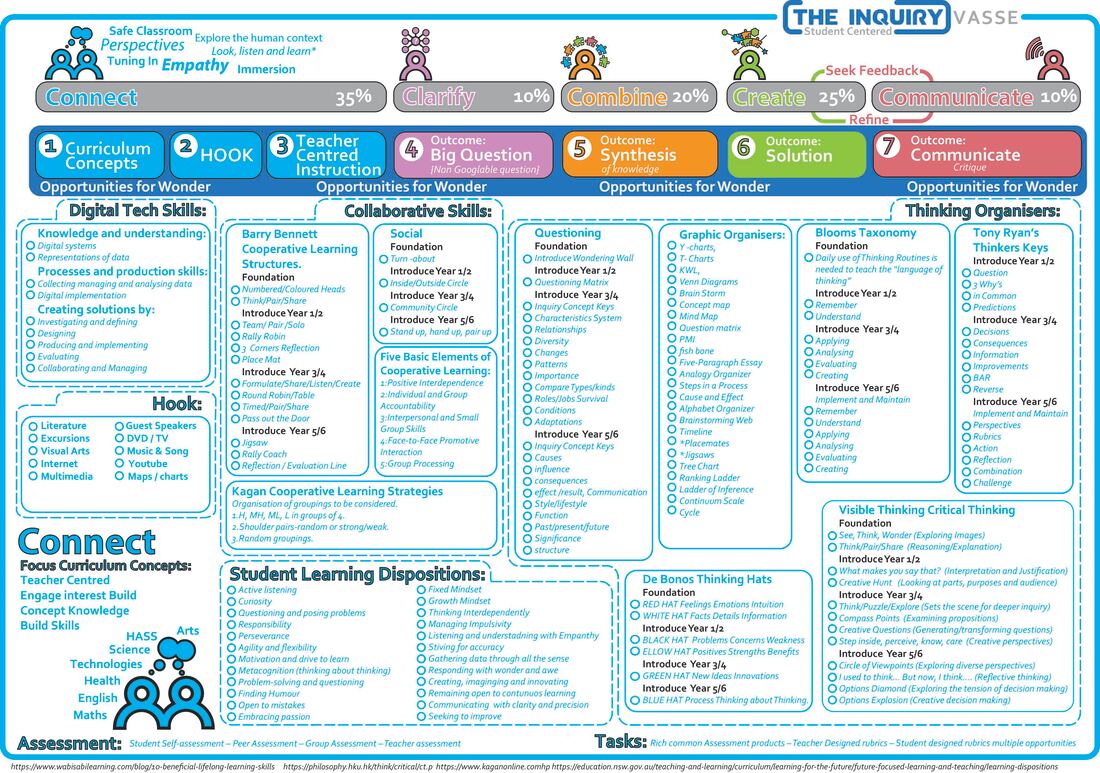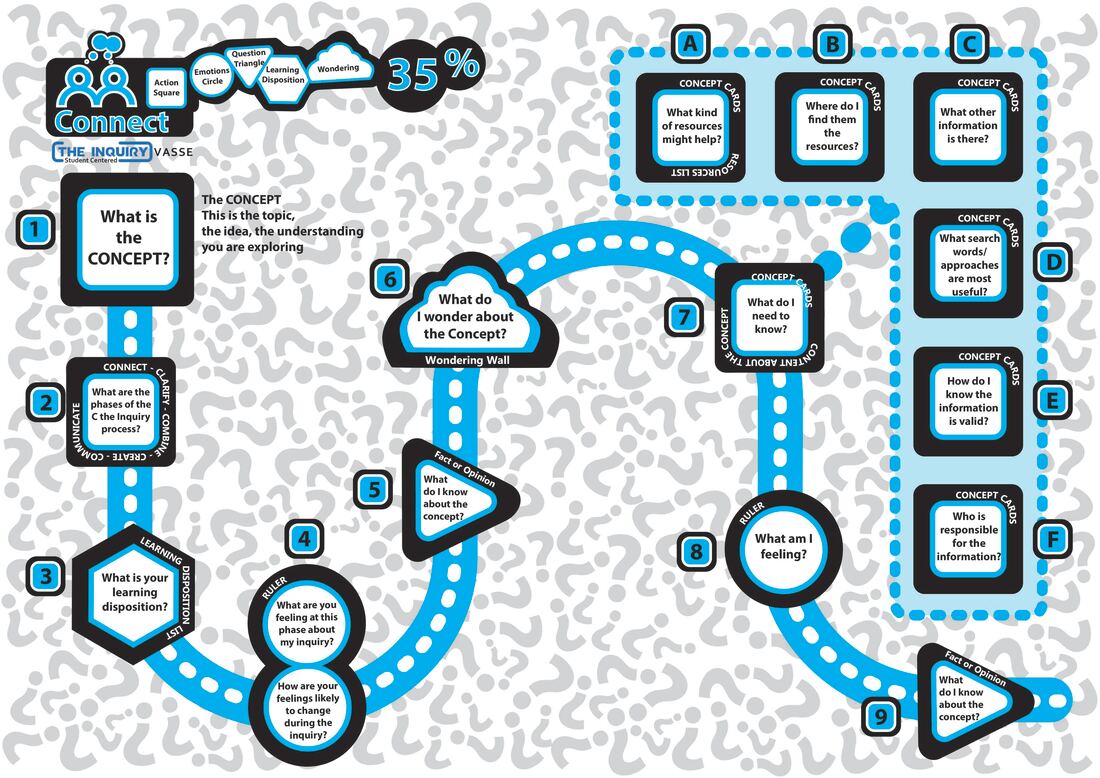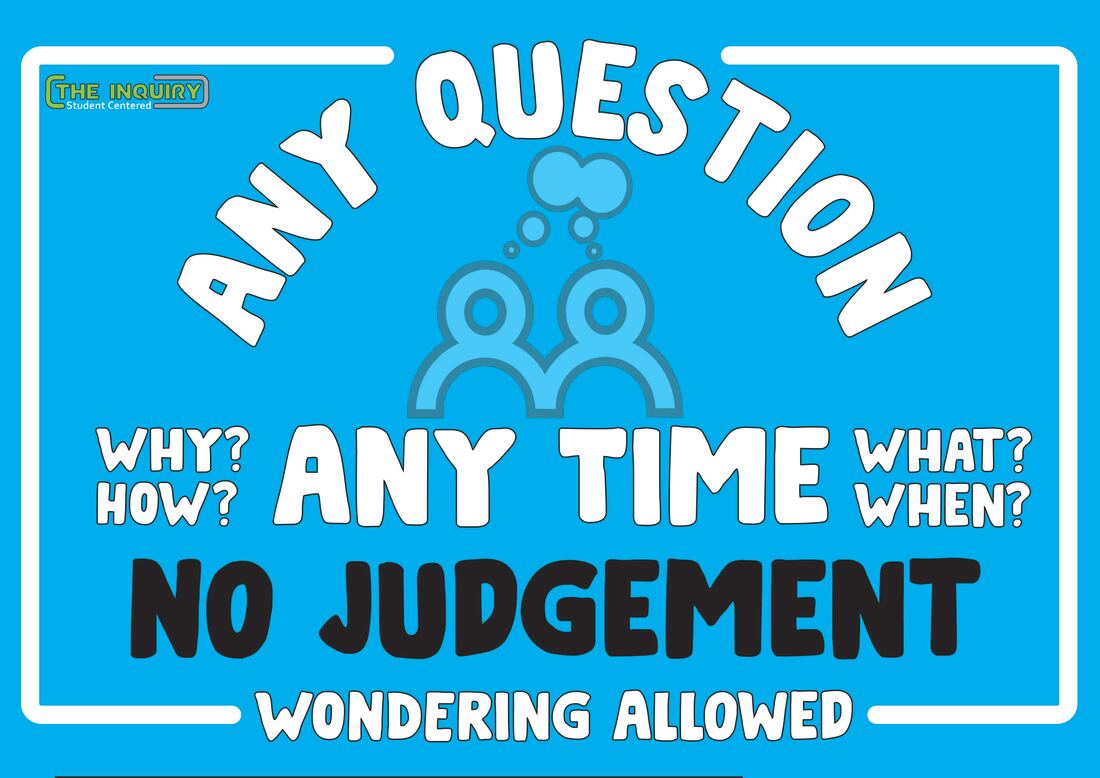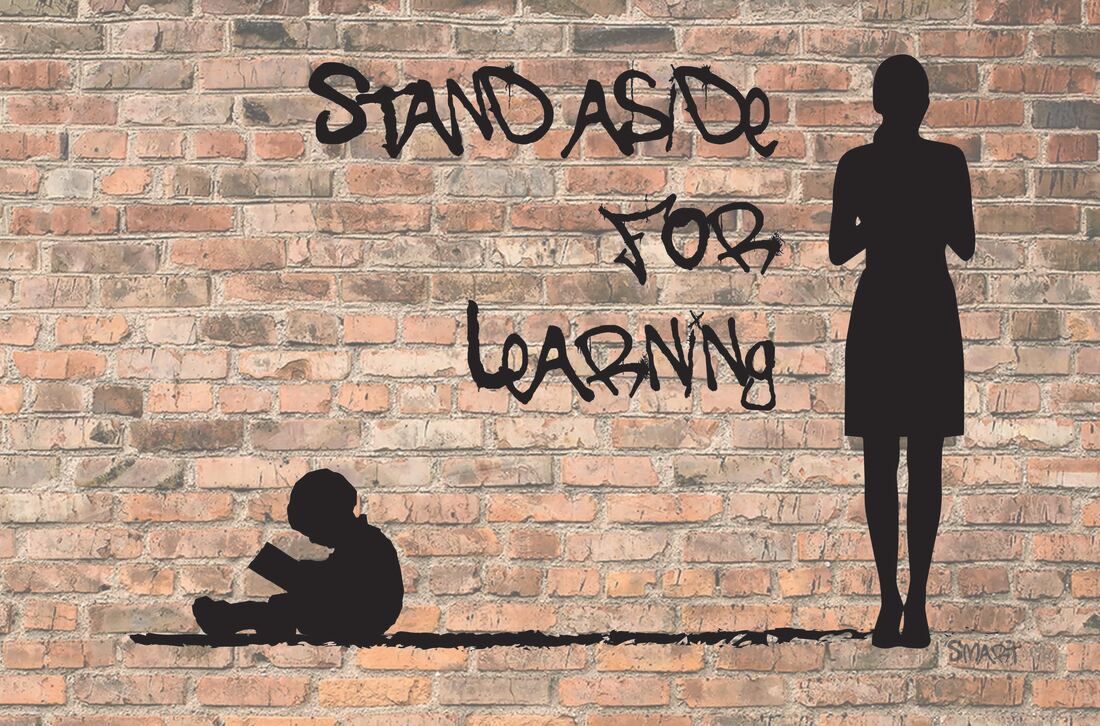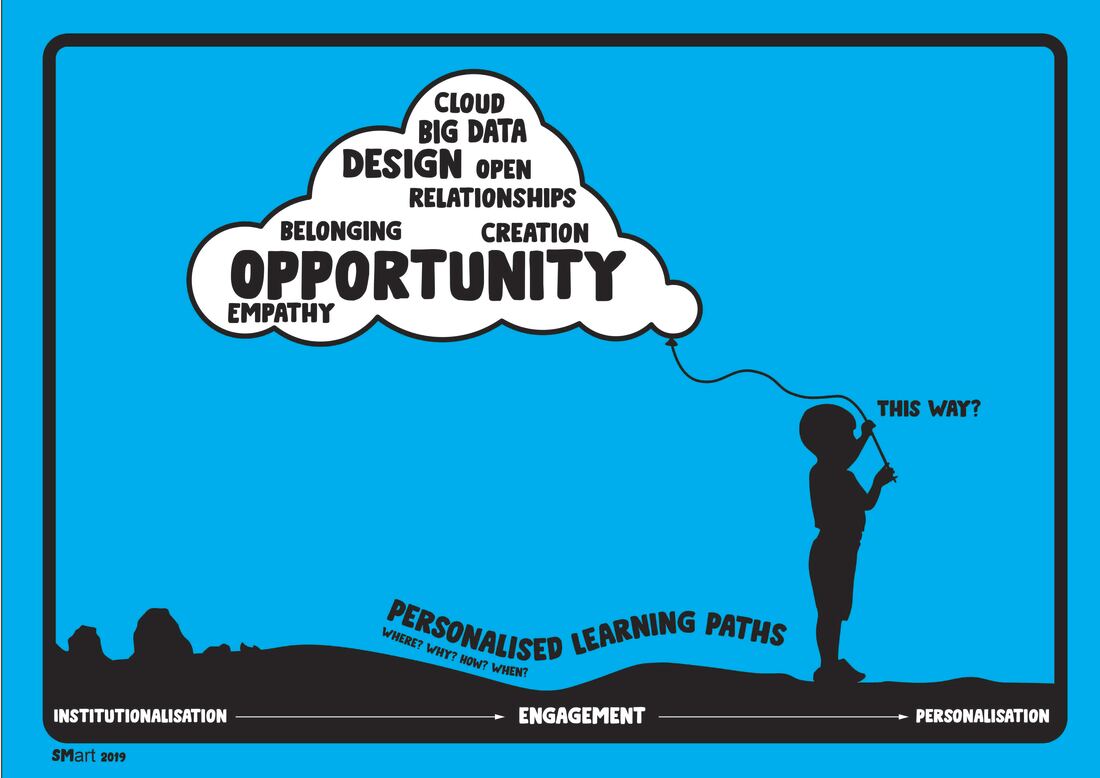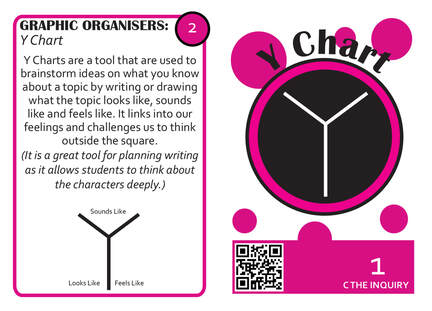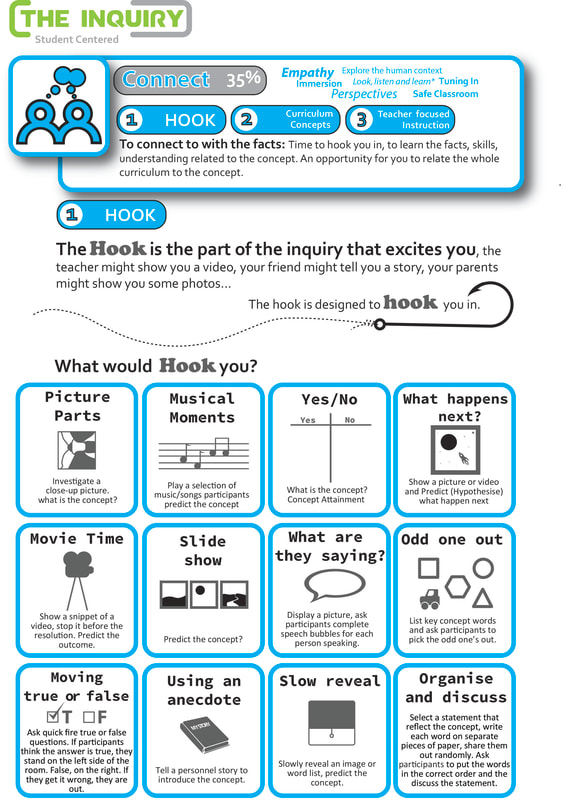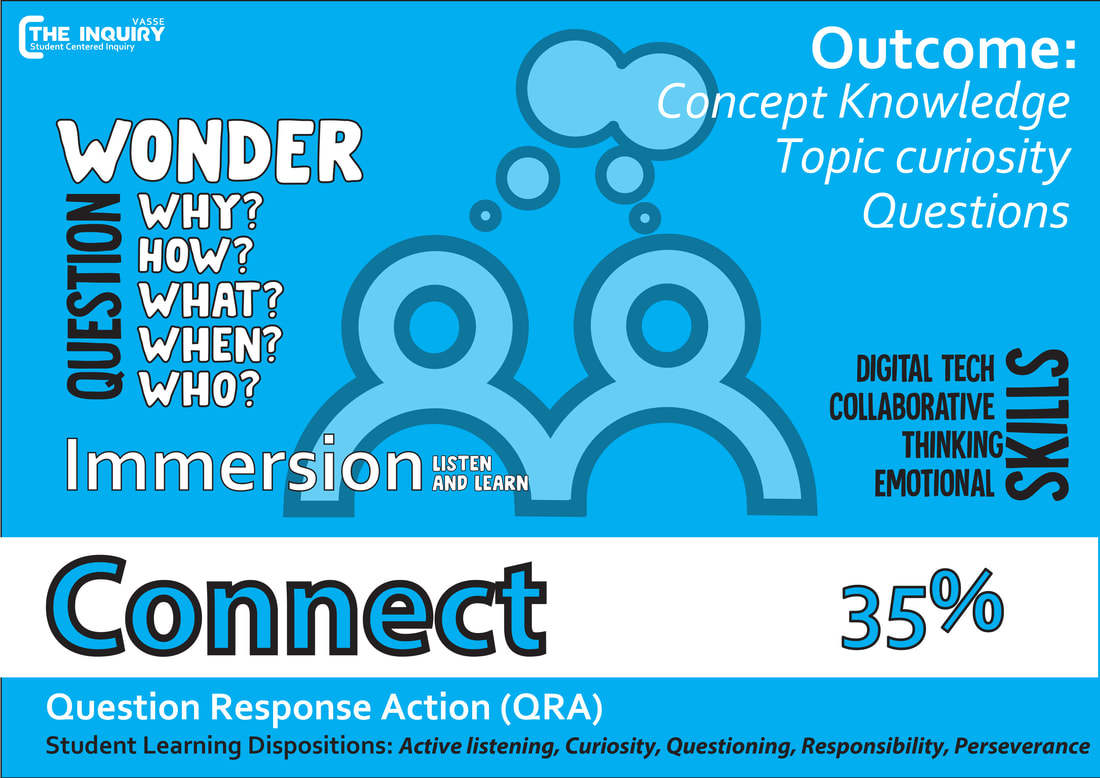C The Inquiry Framework - Connect
Connect
C the Inquiry in more detail
C The inquiry was designed to create a step by step process that guides learners on their inquiry. The C part is a bit of a play on letter sounds – See the inquiry the See becoming C due to all the key elements of the process starting with the letter C
Connect, Clarify, Combine, Create, Communicate.
The sixth and seventh and unwritten C’s are courage and commitment.
C the Inquiry in more detail
C The inquiry was designed to create a step by step process that guides learners on their inquiry. The C part is a bit of a play on letter sounds – See the inquiry the See becoming C due to all the key elements of the process starting with the letter C
Connect, Clarify, Combine, Create, Communicate.
The sixth and seventh and unwritten C’s are courage and commitment.
| connect_set_upsmall.pdf | |
| File Size: | 4066 kb |
| File Type: | |
The process has been developed and tested by experienced educators as a framework for their learning and a guide on how they can support other learners. Each element is critical and all are needed to ensure authenticity of the process. There is always a tendency for learners to focus on one area over another, but it is important to remember the percentages established for each element.
Concept verse Content
This is for schools and teachers, Inquiry learning should be based around a concept not content.
A concept is a thought or idea - Content is subject matter
This is for schools and teachers, Inquiry learning should be based around a concept not content.
A concept is a thought or idea - Content is subject matter
| connect.pdf | |
| File Size: | 472 kb |
| File Type: | |
Connect- some people call it immersion some call it define. If you think about it, it means the same to the inquiring mind. The reason we use the word Connect is because it’s the part of the inquiry where learners are not only immersed in the facts and fascination around a concept, they also become connected with the concept and begin to collaborate with the people around them and their ideas.
The Connect stage is a time to build a relationship with the concept. This is generally led by a facilitator (teacher, parent, friend), and it is a very “teacher” centred part of the process. The facilitator helps the learner discover the concept and can offer tools and direction to further develop your understanding. The Connect stage takes up approximately 35% of the time you will spend on your inquiry. It creates the map for the journey ahead, highlighting the information to find and some of the paths to take.
Information overload is part and parcel with this stage. Some key skills to put in place during this element is note taking, which can be done using a number of different graphic organisers (see Thinking cards). To take good notes Active listening needs to take place. Journal writing/ mind mapping are also some good ways to keep track of the learning. A journal or mind map can be built upon throughout the whole inquiry journey. Lastly my favourite and probably the most important skill to develop is questioning. Without questioning there is no inquiry. (There are a number of question frameworks provided in the question section.)
Learners need to list their questions and observe the questions of others, a good way to do this is using a wondering wall. A place in the learning environment or in an online document that enables ideas of all types to be displayed. Throughout the Connect stage some of these question might be answered, they may also become questions that individual learners may pursue. Part of the “C The Inquiry” resources is also a question pathway that will guide the learner through some core questions that should be asked through each element.
The Connect stage is a time to build a relationship with the concept. This is generally led by a facilitator (teacher, parent, friend), and it is a very “teacher” centred part of the process. The facilitator helps the learner discover the concept and can offer tools and direction to further develop your understanding. The Connect stage takes up approximately 35% of the time you will spend on your inquiry. It creates the map for the journey ahead, highlighting the information to find and some of the paths to take.
Information overload is part and parcel with this stage. Some key skills to put in place during this element is note taking, which can be done using a number of different graphic organisers (see Thinking cards). To take good notes Active listening needs to take place. Journal writing/ mind mapping are also some good ways to keep track of the learning. A journal or mind map can be built upon throughout the whole inquiry journey. Lastly my favourite and probably the most important skill to develop is questioning. Without questioning there is no inquiry. (There are a number of question frameworks provided in the question section.)
Learners need to list their questions and observe the questions of others, a good way to do this is using a wondering wall. A place in the learning environment or in an online document that enables ideas of all types to be displayed. Throughout the Connect stage some of these question might be answered, they may also become questions that individual learners may pursue. Part of the “C The Inquiry” resources is also a question pathway that will guide the learner through some core questions that should be asked through each element.
The Connect stage in a school focuses on four things;
an opportunity to wonder,
facilitator centred instruction,
curriculum concepts and a hook
an opportunity to wonder,
facilitator centred instruction,
curriculum concepts and a hook
|
| ||||||||||||
|
Opportunity to wonder:
As mentioned above all elements of the process require the learner to question and wonder, but the Connect element is the stage where the wondering kicks off and it is critical during this stage to provide opportunities to wonder, not only alone but with others. Using collaborative learning frameworks is a good way to develop wondering amongst groups. Philosophy circles are another tool used to promote wonder. No judgement is imperative, any idea is a good one, any question can be asked. There needs to be some boundaries around the concept. These could be set by the students. It’s important for the facilitator to not bring their own bias and judgment into the conversation. | ||||||
|
Facilitator centred instruction:
The facilitator plays a big role during the Connect stage. In a personal inquiry, the learner becomes the facilitator and for internally motivated learners they can manage this role, for those learners who need a little more guidance the facilitator needs to open up opportunities for the learner, provide sample resources, generate thinking through questioning and providing feedback. One important thing to remember is that inquiry learning is about the learner not the facilitator. The learners path may be challenging and failure may occur, but it is critical that the inquiry remains theirs. This can be hard for teachers as they sometimes find it difficult to stand aside and have preconceived ideas of inquiry outcomes. |
Curriculum concepts:
The Connect stage is where links can be made to the curriculum. Throughout the delivery of the content related to the Inquiry concept, elements of the curriculum can be fed in. This would include information, skills and learning strategies. Remembering the Inquiry concept is the main focus. It is ideal to have a copy of the year level curriculum in a format that enables pre and post programing (See Topic Planning) on hand when developing areas of the curriculum that may assist the inquiry. An inquiry process may take the learner on a meandering path of discovery and understanding. A facilitators role is identifying how to introduce the curriculum in a supportive manner. Skills and understandings can be retaught throughout the complete process, but the connect stage is where the majority should be introduced.
To assist teachers and learners with the development of curriculum knowledge and skills we have developed Concept Cards. Generic task related cards that are based around Blooms taxonomy. Also to add to the depth of the inquiry there is a range of cards that provided suggested action tasks, these Production cards are helpful for the Connect and Create stage. The Thinking Cards out line Graphic organisers that may be helpful for the learner to collate and analyse information.
Links Concept Cards, Production Cards, Thinking Cards
All cards are scaled with a point system so learning tasks can be differentiated and facilitators can develop learning accountability
The Connect stage is where links can be made to the curriculum. Throughout the delivery of the content related to the Inquiry concept, elements of the curriculum can be fed in. This would include information, skills and learning strategies. Remembering the Inquiry concept is the main focus. It is ideal to have a copy of the year level curriculum in a format that enables pre and post programing (See Topic Planning) on hand when developing areas of the curriculum that may assist the inquiry. An inquiry process may take the learner on a meandering path of discovery and understanding. A facilitators role is identifying how to introduce the curriculum in a supportive manner. Skills and understandings can be retaught throughout the complete process, but the connect stage is where the majority should be introduced.
To assist teachers and learners with the development of curriculum knowledge and skills we have developed Concept Cards. Generic task related cards that are based around Blooms taxonomy. Also to add to the depth of the inquiry there is a range of cards that provided suggested action tasks, these Production cards are helpful for the Connect and Create stage. The Thinking Cards out line Graphic organisers that may be helpful for the learner to collate and analyse information.
Links Concept Cards, Production Cards, Thinking Cards
All cards are scaled with a point system so learning tasks can be differentiated and facilitators can develop learning accountability
The Hook:
The last point and not the least, is that the Connect stage is almost always started with a hook, whether it be an individual inquiry or an inquiry worked on in a group or class situation. The hook is what builds passion and intrigue. Without a hook it is very difficult to build engagement in learners, without engagement the concept being learnt about is not going to generate any purpose or impact. Deeper learning experiences will be difficult to attain.
The last point and not the least, is that the Connect stage is almost always started with a hook, whether it be an individual inquiry or an inquiry worked on in a group or class situation. The hook is what builds passion and intrigue. Without a hook it is very difficult to build engagement in learners, without engagement the concept being learnt about is not going to generate any purpose or impact. Deeper learning experiences will be difficult to attain.
Resources Rubric
|
|
|
|
| ||||||||||||||||||||||||||||||
